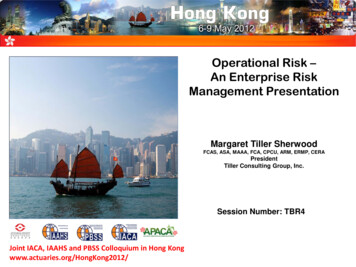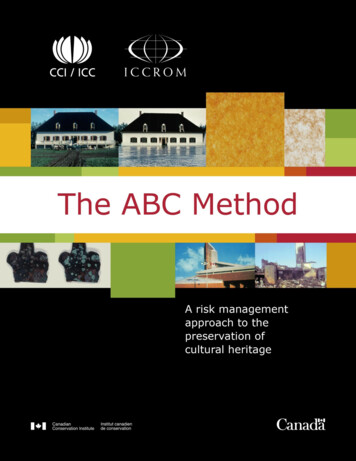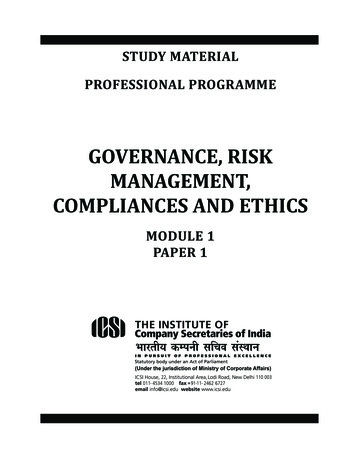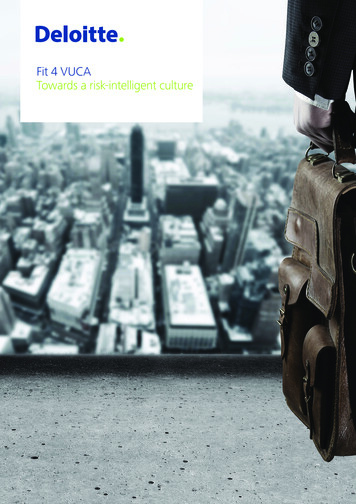
Transcription
Example risk assessment for an office-based businessThe company has 18 staff, with one being a wheelchair user. The offices contain a kitchen where staff can make drinks and heat food – there are toilet andwashing facilities on each floor. The offices are cleaned every evening by contractors, who store the cleaning chemicals in a locked cupboard. The office block islocked from 9 pm to 6 am Monday to Friday and at the weekends. The building also has 24 hour/7 days a week security cover.How was the risk assessment done?The manager followed the advice at www.hse.gov.uk/simple-health-safety/risk/. To identify the hazards, they: walked around the office, noting things that might pose a risk;checked the HSE advice on employees with disabilities: www.hse.gov.uk/disability/;talked to supervisors and staff, including the wheelchair user, to learn from their experience and listen to their concerns;talked to the office cleaning contractors, to make sure the cleaning activities did not pose a risk to office staff;looked at the accident book to see how previous accidents had occurred.They noted what was already being done to control the risks and recorded any further actions required. They pinned a copy of the findings on a noticeboard inthe tearoom to encourage staff to help put the actions into practice.The manager will review the risk assessment whenever there are any significant changes such as new work equipment, work activities or workers.Do not just copy this example and put your company name to it as that would not satisfy the law and would not protect your employees. You mustthink about the specific hazards and controls your business needs.The HSE site has a template and other examples to help you produce your own assessment.
Risk assessmentCompany name: Smith’s ConsultantsAssessment carried out by: J Smith (Manager)Date assessment carried out: 12 September 2019What are thehazards?Who might beharmed andhow?What are you already doing tocontrol the risks?What further actiondo you need to taketo control the risks?Who needs to carry When is theout the action?actionneeded by?Slips and tripsStaff and visitorsmay be injured ifthey trip overobjects or slip onspillages. Better housekeeping instaff kitchen needed, egon spills.All staff, supervisors tomonitor7/10/195/10/19Arrange for loose carpettile on second floor tobe repaired/replaced.Manager7/10/195/10/19Staff risk injuriesor back pain fromhandlingheavy/bulkyobjects, egdeliveries ofpaper. Trolley used to transport boxes ofpaper and other heavy items whencollecting deliveries etc. High shelves for light objects only.Manager4/10/194/10/19Manualhandling ofpaper, officeequipment etcGeneral good housekeeping.All areas well lit, including stairs.No trailing leads or cables.Staff keep work areas clear, eg noboxes left in walkways, deliveriesstored immediately. Offices cleaned every evening.Remind staff thatthey should not tryto lift objects thatlook or appear tooheavy to handle.Done
What are thehazards?Who might beharmed andhow?What are you already doing tocontrol the risks?What further actiondo you need to taketo control the risks?Who needs to carry When is theout the action?actionneeded by?DoneDisplay screenequipmentStaff risk postureproblems andpain, discomfortor injuries, eg totheir hands/arms, fromoveruse orimproper use orfrom poorlydesignedworkstations orworkenvironments.Headaches orsore eyes canalso occur, eg ifthe lighting ispoor. DSE training and assessments ofworkstation carried out by all newstarters. Actions carried out asap. Reassessment to be carried out atany change to work feature, egequipment, furniture or the workenvironment such as lighting. Workstation and equipment set toensure good posture and to avoidglare and reflections on the screen. Shared workstations are assessedfor all users. Work planned to include regularbreaks or change of activity. Lighting and temperature suitablycontrolled. Adjustable blinds at window to controlnatural light on screen Noise levels controlled. Eye tests provided when needed,dutyholder to pay for basicspectacles specific for regular usersof visual displays. Laptop users trained to carry out ownDSE assessment for use away fromoffice. When used at office, laptopshould be used with docking station,screen, keyboard and mouse.Supervisors to monitorto ensure staff continueto get breaks away fromthe computer.Supervisors4/10/194/10/19Check that identifiedactions from selfassessments arefollowed up ASAP.Manager21/10/194/10/19Tell staff that they are toinform their manager ofany pain they have thatmay be linked tocomputer use.All staff21/10/1921/10/19Broken window blindnear accounts section –letter to landlord.Company secretary4/10/192/10/19Remind laptop users tocarry out regular DSEassessment to avoidproblems and identifyany issues.Manager4/10/194/10/19 Staff stand on chair to file on highshelves, put up decorations etc. Internal windows cleaned bycontractor using a stepladder.Chairs are too unstable.Buy appropriatestepladder and showstaff how to use itsafely.Manager4/10/193/10/19Working atheightFiling on topshelves, puttingup decorationsetcFalls from anyheight can causebruising andfractures.
What are thehazards?Who might beharmed andhow?What are you already doing tocontrol the risks?What further actiondo you need to taketo control the risks?Who needs to carry When is theout the action?actionneeded by?DoneStressAll staff could beaffected byfactors such aslack of jobcontrol, bullying,not knowing theirrole etc. Staff understand what their dutiesand responsibilities are. Staff can talk to supervisors ormanager if they are feeling unwell orat ease about things at work. ‘No bullying’ policy.Remind staff they canspeak confidentially totheir manager orsupervisors if they arefeeling unwell or or ill atease because of work.Manager4/10/193/10/19ElectricalStaff could getelectrical shocksor burns fromusing faultyelectricalequipment.Electrical faultscan also lead tofires. Staff trained to spot and report (tooffice administrator) any defectiveplugs, discoloured sockets ordamaged cable/equipment. Defective equipment taken out of usesafely and promptly replaced. Staff told not to bring in their ownappliances, toasters, fans etc. Ask landlord when thenext electricalinstallation safetycheck is due. Confirm the systemwith landlord formaking safe anydamage to buildinginstallation electrics,eg broken lightswitches or sockets.Office ingmaterials(ACMs) arepresent insome partitionwallsStaff carrying outnormal activitiesat very low risk.Asbestos only arisk if fibres arereleased into airand inhaled.Maintenanceworkers most atrisk. Systems in place to informcontractors and others who mightdisturb the asbestos, where it is andto ensure safe working. Partition walls in good condition andasbestos unlikely to be disturbedduring normal activities. ‘Danger, asbestos, do not disturb’signs posted at partition walls. Staff told to report any accidentaldamage immediately. Condition of partition walls checkedperiodically.At next staff meeting,remind staff that theasbestos must not bedisturbed and to reportany accidental damageto the partition wallsimmediately.Manager4/10/194/10/19
What are thehazards?Who might beharmed andhow?FireIf trapped, staffcould suffer fatalinjuries fromsmoke inhalation/burns.Lone workingStaff could sufferinjury or ill healthwhile out oftoffice, eg visitingclients’ offices, orwhile workingalone in theoffice.What are you already doing tocontrol the risks?What further actiondo you need to taketo control the risks?Who needs to carry When is theout the action?actionneeded by?Working with landlord, fire riskassessment done, seewww.fire.gov.uk/workplace safety/and necessary action taken.Ensure the actionsidentified as necessaryby the fire riskassessment are done.ManagerFrom now on Staff write visit details in office diaryand give a contact number. Staff not returning to the office after avisit call in to report this. Security staff check all areas,including toilets, before locking up atnight.Whereabouts of staff‘out of the office’ to bemonitored by officebased staff.Office admin teamFrom now onPublished by the Health and Safety Executive 11/19Done
Manual handling of paper, office equipment etc Staff risk injuries or back pain from handling heavy/bulky objects, eg deliveries of paper. Trolley used to transport boxes of paper and other heavy items when collecting deliveries etc. High shelves for light objects only. Remind staff that they should not try to lift objects that











